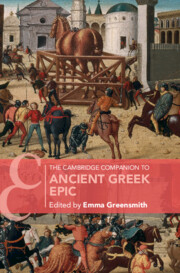Book contents
- The Cambridge Companion to Ancient Greek Epic
- The Cambridge Companion to Ancient Greek Epic
- Copyright page
- Contents
- Figures
- Contributors
- Preface
- Introduction
- Part I Epic Engagements
- Part II Epic Space
- Part III Epic Time
- Part IV Epic People
- Part V Epic Feelings
- Part VI Epic Without End
- 17 Ancient Readers of Greek Epic
- 18 Greek Epic in a Christian Empire
- 19 The Fates of Epic in Byzantium
- 20 Homeric Epic and Nation-Building in Modern Greece and Turkey
- 21 Ancient Greek Epic and the Cinema
- Epilogue
- Timeline of Ancient Greek Epic
- Bibliography
- Index Locorum
- Subject Index
- Cambridge Companions To Literature
20 - Homeric Epic and Nation-Building in Modern Greece and Turkey
from Part VI - Epic Without End
Published online by Cambridge University Press: 04 December 2024
- The Cambridge Companion to Ancient Greek Epic
- The Cambridge Companion to Ancient Greek Epic
- Copyright page
- Contents
- Figures
- Contributors
- Preface
- Introduction
- Part I Epic Engagements
- Part II Epic Space
- Part III Epic Time
- Part IV Epic People
- Part V Epic Feelings
- Part VI Epic Without End
- 17 Ancient Readers of Greek Epic
- 18 Greek Epic in a Christian Empire
- 19 The Fates of Epic in Byzantium
- 20 Homeric Epic and Nation-Building in Modern Greece and Turkey
- 21 Ancient Greek Epic and the Cinema
- Epilogue
- Timeline of Ancient Greek Epic
- Bibliography
- Index Locorum
- Subject Index
- Cambridge Companions To Literature
Summary
This chapter traces the shadow that ancient Greek epic, and the Homeric poems most particularly, have cast over the modern nations of Greece and Turkey, using case studies with a specific focus on how the epics came to figure in the nation-building work of both countries. Greece presents a unique case for the reception of these poems for two related reasons: Homeric Greek can be integrated into modern Greek literature without transl(iter)ation, and a long-standing national discourse casts the Greek heroes of the Iliad and Odyssey as the ancestors of Greeks living today. On the other hand, Turkey, whose borders encompass the ancient site of Troy, made different use of the Homeric tradition. During the self-conscious process of Westernisation in the twenty-first century, the Homeric poems were among the first great works of ‘Western’ – not Greek – literature to be translated by translators working in the employ of the state. Hanink uses these contrasting studies of the national receptions of ancient epic in the ‘Homeric lands’ to point to the range of ways that Homeric poetry has been invoked in modern nation-building projects.
Keywords
- Type
- Chapter
- Information
- The Cambridge Companion to Ancient Greek Epic , pp. 422 - 441Publisher: Cambridge University PressPrint publication year: 2024

